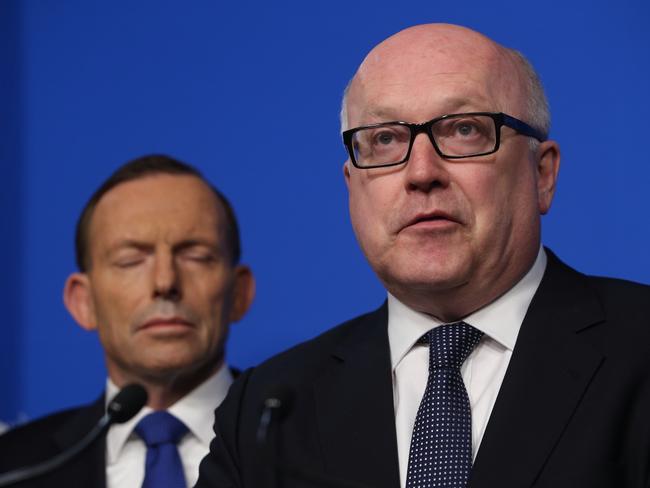Malcolm Turnbull tries to clear up his colleague’s metadata confusion
MALCOLM Turnbull has stepped in to explain just what’s happening with our metadata after George Brandis muddied the waters in a cringe-worthy interview.
IF YOU’RE confused about just what metadata the Abbott government wants to store for two years in its counterterrorism fight, don’t worry - you’re not alone.
It seems they are a bit too.
But never fear, Malcolm Turnbull is here to help.
The Communications Minister, the man jokingly said to have helped create the internet in Australia, has stepped up explain just what’s happening after his colleagues Tony Abbott and George Brandis muddied the waters.
Mr Turnbull this morning said “it is not the case” that agencies will be given access to a record of the IP addresses of websites people visit.
That’s despite the Attorney General suggesting they would be held during his cringe-worthy Sky News interview on Wednesday.
“Well, what people are viewing on the internet when they web surf is not going to be caught. What will be caught is the web address they communicate to,” Senator Brandis said.
Instead only the IP address assigned to you would be stored, the Communications Minister insisted on ABC Radio.
“The security services, the Police, ASIO and so forth are not asking the government to require telcos to record or retain information that they are not currently recording,” Mr Turnbull said, claiming he wanted to “clear a few things up”.
“There has been some concern expressed that the government was proposing that telcos could retain for two years a record of the websites that you visit when you’re online, whether that’s expressed in the form of their domain names or their IP addresses.
“That is not the case.”

He was adamant what will be collected does not “relate to the content of the websites” Australians look at, but rather the IP address number allocated to when you connect to the internet.
“The reason this is important is that if at some point it is identified that an IP address which, say, belongs to Telstra has been engaged in some activity on the net, the security people want to be able to go back to Telstra and say IP address 1234 etc., who was the account that was linked to on 4 June 2013?
The telco can then say it was Malcolm Turnbull for example, he said.
The Minister said he believed his explanation is “consistent with what the Prime Minister and the Attorney-General has said”.

“My concern is simply to be crystal clear about what we’re talking about. One of the difficulties with a term like metadata is that it can mean different things to different people. So you to be very clear about what we’re talking about.
“I am part of this Government and I am explaining I hope with clarity and precision I am explaining what the agencies are seeking.”
Fresh from a meeting with Senator Brandis and security agency heads, Mr Turnbull said the policy is still being nutted out with the telecommunications industry.
Agencies are also seeking access to the metadata of phone calls — including when and where the call was made and for how long — but not its content.

ASIO Director General David Irvine confirmed what Mr Turnbull said, that they are not seeking to know details about what websites you’ve visited.
For that they need a warrant, he explained.
“If you sit down tonight and Google this and that and get on to this and that particular website, I am not expecting, and legally we would not be able to find out what you were doing, except if we had reason to get a warrant to do so,” he told reporters in Canberra.
Instead they simply want to be able to go to Telcos with an IP address and find out the identity of the person using it.
After days of confusion, Deputy Federal Police Commissioner Andrew Colvin admitted metadata is “complicated”.
Both stressed the importance of the agencies involved in counter-terrorism being able to access it.
“We’re not asking for something that is unique to the Australian environment, we are asking to protect something that has been in existence for a long time and if we were to lose this, either through data not being retained or through changes to technology, our ability to solve crime and prevent crime will be severely impaired,” Mr Colvin said.
It is also crucial to help discount people from investigations Mr Irvine explained.
“Our ability to use metadata is just as important in eliminating people from suspicion as it is from incriminating them.”
The Director General said ASIO is working in “overload” to deal with the current terrorist threat to Australia and it is important to “maintain and update the tools” available.



